|
|
|
Sort Order |
|
|
|
Items / Page
|
|
|
|
|
|
|
| Srl | Item |
| 1 |
ID:
096916


|
|
|
|
|
| Publication |
2010.
|
| Summary/Abstract |
The article has two main theses: first, that from 1958 to 1967-Charles de Gaulle's presidency-there was a typical patron-client relationship between France and Israel that lasted until the Six Day War. It challenges the frequent claim in the literature that relations between Israel and France did not essentially change after de Gaulle's rise to power. Second, it argues that the basis on which this relationship was founded was rocky from the start since as a client, Israel was not ready to accede to French demands that it restrain its security policy to conform to key French interests.
|
|
|
|
|
|
|
|
|
|
|
|
|
|
|
|
| 2 |
ID:
096912
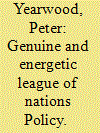

|
|
|
|
|
| Publication |
2010.
|
| Summary/Abstract |
At the end of April 1922, S.P. Waterlow of the Central Department of the Foreign Office, which dealt with Franco-German relations and European security, put up a memorandum. This claimed: "Except on paper and as an expedient for minor purposes or an escape for some dilemma, we have not taken the League [of Nations] seriously." It contrasted London's indifference with the active use which Paris was making of the League, asserted that "the objects of British policy and those of the League are broadly speaking identical," and urged: "let us institute a genuine and energetic League of Nations policy." This recommendation was strongly endorsed by the Assistant Under-Secretary, Sir William Tyrrell, who believed that such a policy would secure almost universal popular support for co-operation with France, and he proposed making a joint declaration that for the purpose of maintaining the frontiers created by the Treaty of Versailles: "the two countries would place at the disposal of the League all their resources for the enforcement of its decisions."1
|
|
|
|
|
|
|
|
|
|
|
|
|
|
|
|
| 3 |
ID:
096917


|
|
|
|
|
| Publication |
2010.
|
| Summary/Abstract |
This article explores the pivotal, but largely neglected 1977-1978 German neutron bomb (ERW) controversy in its broader domestic and international contexts. It explains how a domestic ideological intra-Social Democratic Party (SPD) argument over "security" and "Germany" between chancellor Schmidt and SPD executive party secretary Bahr turned a secret governmental issue-the question of ERW production and deployment-into a highly politicised public debate. Internationally the ERW affair revealed a deep Euro-Atlantic rift and rapidly worsening East-West relations which could threaten the "German" situation. On the domestic scene Bahr used the opportunity to stimulate moralist-pacifist thinking within his party and among the wider public by which he not only risked association with Soviet peace diplomacy, but also challenged Schmidt's political authority and strained the government coalition beyond repair. Above all, however, it provided the political context for Schmidt to embrace an international leadership role by verbalising his initial ideas of what in 1979 would become NATO's landmark "dual-track decision."
|
|
|
|
|
|
|
|
|
|
|
|
|
|
|
|
| 4 |
ID:
096915
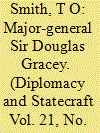

|
|
|
|
|
| Publication |
2010.
|
| Summary/Abstract |
Current events in Afghanistan have once again placed the political context of British forces acting in difficult circumstances under the global microscope. This article focuses upon the high policy difficulties of administering peacekeeping duties by examining the controversial role of Major-General Gracey in South Vietnam and Cambodia in 1945. Gracey's British and Indian troops were deployed in French Indo-China to oversee the surrender of Japanese forces and the liberation of the Axis occupied territory. But they quickly became entangled in peacekeeping duties between the returning French colonial regime and the emergence of various Vietnamese groups determined to take advantage of the power vacuum. By examining both primary and secondary sources and scrutinising Gracey's private papers this article attempts to reappraise a difficult period in British history.
|
|
|
|
|
|
|
|
|
|
|
|
|
|
|
|
| 5 |
ID:
096918
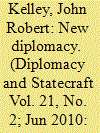

|
|
|
|
|
| Publication |
2010.
|
| Summary/Abstract |
The continued rise of the non-state actor in twenty-first century international politics issues a potent challenge to state primacy in the area of diplomacy. Diplomacy's statist tradition, once the bedrock organising institution for pursuing international politics, is ceding influence to non-state actors-the "new" diplomats-who have displayed impressive skill at shaping policy through means that foreign ministries fail to grasp. To the chagrin of established scholars and practitioners, this paper claims that nothing has transpired to suggest the diplomatic profession is doing anything but pluralising. Furthermore, the process by which the foreign ministry opens itself to the public increasingly resides with the latter. Does this revolution mean the evolution of the "new diplomacy" has materialised? The contents in the following pages suggest so, and the main reason for this is built upon a radical view of agency: the age of diplomacy as an institution is giving way to an age of diplomacy as a behaviour. Yet despite who dominates in the art of influence, caveats remain and it appears likely that each side will need the other to achieve successful statecraft in the years to come.
|
|
|
|
|
|
|
|
|
|
|
|
|
|
|
|
| 6 |
ID:
096919
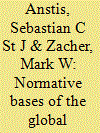

|
|
|
|
|
| Publication |
2010.
|
| Summary/Abstract |
This article analyses states' support for international norms relating to the location of international boundaries. The key norms relate to the legitimacy of the international use of force, the placement of boundaries relative to previous international boundary accords, the views of populations, and broadly accepted ethical standards. These norms have become stronger over recent centuries, but their relative strength has varied. In comparing the influence of these norms in territorial disputes, this study aims to contribute to the understanding of international territorial politics and of the evolution of state sovereignty. Of particular note is that self-determination and human rights have achieved some modest but historically significant gains since the end of the Cold War.
|
|
|
|
|
|
|
|
|
|
|
|
|
|
|
|
| 7 |
ID:
096914
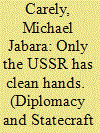

|
|
|
|
|
| Publication |
2010.
|
| Summary/Abstract |
The first part of this two part essay is a re-examination of the Czechoslovak crisis (1934-1938) based on papers from the Arkhiv vneshnei politiki Rossiiskoi Federatsii in Moscow. The essay is also grounded in British, French, and Romanian archives and the standard published collections, including the American and German series. It is about the development and conduct of Soviet collective security policy in the key years leading to the "Munich crisis" in September 1938. Evidence from the Moscow archives demonstrates that the Soviet government was serious about collective security and that it was ready to participate in an anti-Nazi alliance. Its initiatives were repeatedly rebuffed in Europe, notably in Paris and London. Even in Prague, the Czechoslovak president, Eduard Bene , was an undependable ally. These rebuffs led the Soviet government to be cautious during the Munich crisis. The Soviet Union would not act unilaterally, but what it actually did do was intended to defend Czechoslovak security within the constraints of Anglo-French abandonment in which Bene himself was complicit.
|
|
|
|
|
|
|
|
|
|
|
|
|
|
|
|
| 8 |
ID:
096913
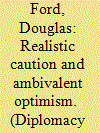

|
|
|
|
|
| Publication |
2010.
|
| Summary/Abstract |
Throughout the years prior to the outbreak of the Pacific War, the United States defence establishment held an ambiguous view on Japanese policy and strategic aims. A number of factors precluded a clear-cut forecast, among the most important of which was the opportunistic and secretive manner in which Japanese leaders formulated their plans. Under the circumstances, the available intelligence could not provide a definite indication of the moves which the Imperial Japanese Navy (IJN) and Imperial Japanese Army (IJA) would undertake. The situation was further complicated because reliable pieces of evidence revealed Japan did not possess the military and economic resources to defeat a coalition of several Great Powers. The Americans were thus not inclined to expect the Imperial forces to undertake a full-scale conquest of the Asia-Pacific region. The inadequate knowledge of Japanese war plans, in turn, was one of the key factors which led United States defence officials to believe that efforts to bolster their military strength in the Far East were not necessary.
|
|
|
|
|
|
|
|
|
|
|
|
|
|
|
|
|
|
|
|
|